- Home
- Daily Meditation
God of Purpose
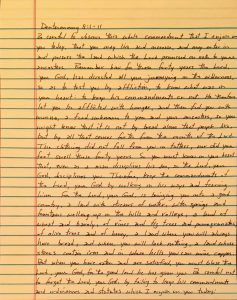
Deuteronomy 8:1-11
Synopsis Deuteronomy 8:1-11 2/3/2018
Moses remembered how the Lord had allowed the Israelites to experience struggle. God did this in order to reveal their hearts to themselves. He gave them manna so they would know that men do not live by bread alone.
Men and women were not created for merely chasing after the things of this earth. Instead, people truly find life by paying attention to every word that comes from God’s mouth.
Moses reminded the people that as long as they had faithfully followed God, they had lacked nothing. Their clothes did not wear out and their bodies remained strong for the journey, no matter where they had been called to go.
God is Sovereign, Purposeful and Faithful
The apostle Paul once wrote, “We know that all things work for good for those who love God, who are called according to his purpose” Rom 8:28
God has orchestrated your circumstances. Your life is not a chance affair.
God has arranged my circumstances.
And like the ancient Israelites, my circumstances allow me to see my heart. I react and respond to the people, places and things in my life. As I do, what I truly believe is made visible through my actions. It’s the same for all. What I have learned from life – what I’ve failed to learn from life; it’s all manifest in my response to what’s given.
To my successes I owe all thanks to God. He inspires every worthy thought in my mind. From my failures – through my failures, I begin to see what holds me back from loving. In these I recognize what keeps me from creating the value that the rest of the community needs.
God is Unchanging
Moses saw this. He recognized that in God, men and women could live free from anxiety. He understood that we – each of us – experiences life as a process of learning. We learn to love God. We learn to love neighbor. Reflected experience is our greatest teacher.
We learn from every interpretive word that proceeds from the mouth of God.
And His promise to us is that, if we make living out His words our life purpose, then He will take care of the rest.
That’s kind of a staggering promise. Everything that creates anxiety in me can be laid to rest. All I have to do is follow. All I have to do is seek His word and obey. The rest, He promises, is covered.
Bring the whole tithe into the storehouse, that there may be food in my house. Put me to the test, says the LORD of hosts, And see if I do not open the floodgates of heaven for you, and pour down upon you blessing without measure! Malachi 3:10
Destined for Success
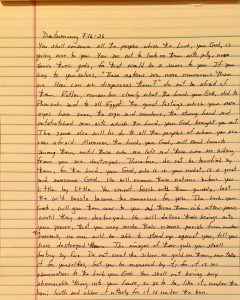
Deuteronomy 7:1
Synopsis Deuteronomy 7:16-26 2/2/2018
Moses spoke to the Israelites to encourage them about the coming conquest over the land of Canaan. He commanded them to utterly destroy the peoples already living in the land. To not be afraid of them – remembering how God prevailed over the Egyptians. And to completely destroy any and all references to their religious systems.
Life Without Anxiety
How different would your life be if you knew that you couldn’t fail?
God promised the Israelites victory in overtaking the land of Canaan – the Promised Land. If they believed Him and followed his prescription, then they would prevail. The decisions they made would be the right decisions. Their plans would succeed. They wouldn’t be able to fail
This was His promise.
Your Promise Today
After the resurrection, Jesus claimed that “all power in heaven and on earth has been given to me.” And, He gave his followers a mission. The people who received this understood that God, in Jesus Christ, would, “…Never forsake you [them] or abandon…”
If you have faith in Christ, you cannot fail.
If I have faith in Christ, I cannot fail.
It’s a simple truth. No anxiety can touch this.
“Thus we may say with confidence: “The Lord is my helper, [and] I will not be afraid. What can anyone do to me?” Heb 13:6
Covenant God
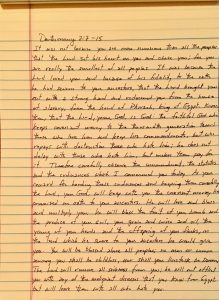
Deuteronomy 7:7-15
Synopsis Deuteronomy 7:7-15 2/1/2018
Moses interpreted why God had chosen Israel. He observed that the Lord had chosen Israel despite the smallness of its size because of the oath God had made to the ancestors. From this, all people can know that God is faithful to His covenants. Accordingly, Moses encouraged the Israelites to keep covenant with Him.
Covenant and Contract
Covenant is different than contract. The relationship is determined.
Contracts confer rights. They are agreements between two, more or less, equal parties. They describe the agreed upon behavior of each. They end when the contracts term ends or whenever one of the people breeches the contract.
Covenant is different. Covenant with God is very different. No one can bargain with God for better terms or more rights. Covenant is an offering. It flows forth from as an opportunity to be in relationship. the very powerful to the much less powerful – or even the powerless. It determines the way that a powerful person is willing to relate to the less powerless. That’s what makes it different than a contract.
Covenant and Natural Law
A covenant relationship with the Creator of all things takes on a slightly different character. Not only are the terms of relationship determined by the Creator, but the terms take on the form of a natural law.
God, the Creator, has determined the essential nature of relationship between Him and human beings. We, the created, respond to the opportunity of relationship within the range of our liberty. Nothing any human can do affects the nature of the covenant.
He is always faithful. He chose to create. He chose the nature of the relationship.
This is the given.
In our turn, we chose every day how we will respond to that which is given.
“If it is displeasing to you to serve the LORD, choose today whom you will serve, the gods your ancestors served beyond the River or the gods of the Amorites in whose country you are dwelling. As for me and my household, we will serve the LORD.” Joshua 24:15
The Ban
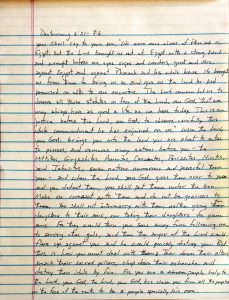
Deuteronomy 6:21-7:6
Synopsis Deuteronomy 6:21-7:6 1/31/2018
Moses described the need to destroy the nations who occupied the Promised Land. He noted that the nations Israel would displace were more numerous and powerful than they.
He especially forbid intermarriage with the people living in Canaan. He feared that any survivors from the Israelite invasion would lead the people to worship false gods. This would undermine the entire Authentic Community.
Finally, Moses reminded the Israelites that they were special. God had chosen them from amongst all the people on earth. This special relationship bore a certain responsibility.
Abraham and Isaac
Recognizing his son’s need for a bride, Abraham tasked his servant to return to Haran. This was the city of Abraham’s father. The servant’s job was to find a bride for Isaac from amongst his own family. Abraham insisted on two things:
- The bride must not come from Canaan
- Isaac must not return to his family in Haran.
The woman would have to be brought back to Isaac. This would preclude the risk that Isaac would be led to worship the gods of the Canaanites. Preventing Isaac from visiting Haran would protect him from the allure of family stability away from the land that God had promised Abraham.
Moses knew the story well. It served as a microcosm of the danger he faced. And it gave a foreshadow of the solution.
Love for God and Neighbor
So what does it mean for me? How do I protect my identity in Christ and avoid being seduced by the idols of my age?
It’s the combination. The command I received wasn’t only to love my neighbor as myself. Elsewise, I’d become an enabler. I would do for my neighbor what I would want for myself – which sounds great except most of my natural desires are entirely evil.
However, in loving God first – in making relationship with God my first priority – things are different. Imagine that my greatest desire is to know and love God. Imagine that this is what I recognize as best in life. If that’s what I valued, then what I would want for others would be that they could know and love God. The two loves would become aligned. The love I show to my neighbor takes its rightful and appropriate place.
Jesus said to him, “If you wish to be perfect, go, sell what you have and give to [the] poor, and you will have treasure in heaven. Then come, follow me.” Matt 19:21
Paradox of Perfect Leadership
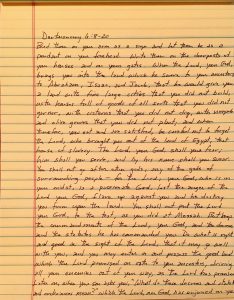
Deuteronomy 6:8-20
Synopsis Deuteronomy 6:8-20 1/30/2018
Moses encouraged the people to meditate on the law. He specifically directed them to use repetition. Recount the law often. He connected this with a warning that the greatest challenge the Israelites face is wealth. He warned them to not forget the God who brought them out of slavery and into abundance.
Moses and the Next Generation
In the Exodus, the children of Israel were utterly, entirely and obviously dependent on God for their daily way of existence. They couldn’t forget God if they wanted to. His physical manifestation was never more than a few hundred feet away. He gave them the manna, the “bread from heaven”, every morning. Relationship with God was a fully integrated part of the everyday life of the community.
As he spoke, it is clear that Moses understood the people he was talking to couldn’t imagine forgetting God. But he also understood that wealth and distance can make people disconnected – can make them forget. He also knew if that present generation wasn’t faithful to teach the next generation about God, then the project would fall apart. The Authentic Community would fail in infancy.
The Paradox of Great Leadership
Lao Tzu is quoted as saying, “A leader is best when people barely know he exists, when his work is done, his aim fulfilled, they will say: we did it ourselves.”
A great leader has so much respect for the autonomy of those led, that it is easy for followers to forget that they are being led. From a leadership perspective, this power denotes the highest degree of skill and freedom possible. A great leader doesn’t feel the need to be acknowledged in order to be satisfied. Freedom, especially from pride, allows for the expert use of this power.
God as Leader
God doesn’t need my praise. He created me. He fully respects my autonomy. He is the author of wisdom. His is perfect leadership.
The paradox part of great leadership is that the people still need the leader, need the wisdom, need the vision – whether or not they realize it.
God respects the autonomy He gave me so much, that He doesn’t demand credit for my success. And so, if it’s possible to forget Him, am I the worse for His perfect leadership? That’s the paradox.
Moses saw this hazard: The greatest danger to Israel was that they should forget God. Because if they did, they would be left believing they had accomplished the great cultural achievements of ancient Israel on their own. They would stop following God, as God. They would begin using Him like a magic trick – believing He was unnecessary to their happiness and success.
The Post-Modern Paradox
Nowadays, they say we live in the time of the greatest technological progress in the history of mankind. They say there is no problem we can’t solve for ourselves if we work together. We will conquer Mars, then the solar system. Our imaginations are our only real constraint. Even for that we’ve invented artificial intelligence.
I see this. I think of Israel.
The greatest danger to me – the greatest danger to the Authentic Community – is the same.
“For you say, ‘I am rich and affluent and have no need of anything,’ and yet do not realize that you are wretched, pitiable, poor, blind, and naked.” Rev 3:17
Shema Revisited
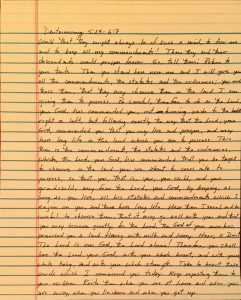
Deuteronomoy 5:29-6:7
Synopsis Deuteronomy 5:29-6:7 1/29/2018
Moses reminded the people of how they had expressed dread fear in the presence of the Lord. For that reason they were dismissed and sent back to their tents. Moses mediated for them from that time on. God, Himself, had given the Decalogue in an overwhelming voice. But, it was Moses who had commanded the great Shema.
Shema
“Hear, O Israel! The LORD is our God, the LORD alone! Therefore, you shall love the LORD, your God, with your whole heart, and with your whole being, and with your whole strength.”
The first and greatest commandment. The morning and evening prayer of every practicing Jew.
How many books have been written about this fundamental prayer?
You Shall Love
So, who is the you? We read this as a personal call. “You” (I) shall love the Lord your (my) God…
And this isn’t wrong. We each bear this command as a personal responsibility.
But Moses made a collective call. “Hear O Israel…” All Israel is collectively commanded to love God.
What would it look like if “we” (Authentic Community) collectively accepted the command and loved God with our whole heart, and with our whole being, and with our whole strength?
“You are not far from the kingdom of God.” Mark 12:34
Law and Sin
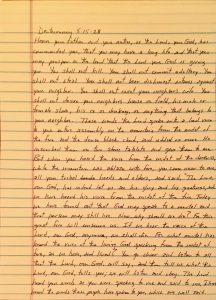
Deuteronomy 5:15-28
Synopsis Deuteronomy 5:15-28 1/28/2018
Moses recited the Ten Commandments. After that, he recounted the memory of how tribal leaders came to him and asked that he mediate between the people and God. Hearing God speak was both awesome and overwhelming. Although they had seen and heard God and survived, the people feared they might die if they heard more words directly from God.
Fear of God or Fear of Law?
Moses recounted how God gave the Ten Commandments directly to the people. Once He finished, the people asked Moses to mediate for them with God because they were so afraid.
But whence the fear? Was it the presence of God or the content of His commands?
Law of Sin and Death
What if we expressed the ideas contained in the Ten Commandments like this: Keep God as the exclusive center of your focus; Honor Him in all your ways; Rest on the Sabbath; Make every effort to respect other people, especially parents. Make every effort to assure the safety of other, nearby people. Never use another person merely for personal gratification. Respect the property of others. Celebrate the good things that God has put into each person’s life, knowing that we all have the material possessions that are necessary for our success in this particular moment.
Totally non-controversial. What’s there to argue with? These platitudes describe what’s necessary for a robust and healthy community to thrive. It’s a description of what we all want.
But codify these same ideas as laws that people are morally bound to obey – it feels different.
Fear and Death
I feel anxiety.
Though I agree with these ideas in principle, I can imagine myself failing. What if I inadvertently break the law? What if I deliberately break the law? Then what?
The downside of the law is its consequences for failure. When I focus on the possibility of punishment, the law no longer looks like a description of the ideal community. Instead, it looks like a trap. It feels like a trap – to which I will inevitably succumb.
My concern for self creates my anxiety. I don’t value the law – I disvalue the law. I look for ways to make it not apply to me – even though I’m fine with making it apply to everyone else.
And with this, it seems the law has made me worse than I was before it came. It has forced me to make a decision. I have had to choose between the Authentic Community and my self-interest. And given this as the range of my liberty; I always decide in my own favor.
Stay Tuned.
“For what the law, weakened by the flesh, was powerless to do, this God has done: by sending his own Son in the likeness of sinful flesh and for the sake of sin, he condemned sin in the flesh, so that the righteous decree of the law might be fulfilled in us, who live not according to the flesh but according to the spirit.” Rom 8:4-5
Reverence and Rest
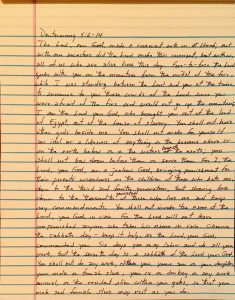
Deuteronomy 5:2-14
Synopsis Deuteronomy 5:2-14 1/27/2018
Moses reminded the Israelites of their personal and generational responsibility to God. The relationship was unique because God actually spoke to the people from the mountain at Horeb. He went on to describe what God expects. He described the kinds of behaviors that are fundamentally incompatible with people who dwell in the presence of the Lord. We call these the ten commandments.
Crime and Punishment or Reverence and Rest
It is not surprising that people who dwelt in the literal presence of God should form a unique culture. Yet, I don’t know that I have ever before thought of the Ten Commandments in quite that way.
I was raised with the idea of the Ten Commandments as a way of defining bad behaviors – sins. They were laws. Lines to not be crossed. Those things I might do that were rightly punishable as crimes.
And perhaps that’s not an invalid understanding. But, in this moment, I’m struck at how much deeper this goes.
These commandments are a description of the cultural norms of a community that values the presence of God. If we were anthropologists, we might say, “this is how people behave when they believe they dwell in the presence of God.”
Natural Rest
When I think of the commandments as laws – then I perceive them as limits on my liberty – imposed constraints – part of the cost of dwelling with God – part of the cost of getting into heaven.
When I think of the commandments as the fruit of righteousness – a description of how God-minded people naturally live – an overflow of the joy and simplicity and love of people who live in the radiance of their creator; then I perceive them as the natural fragrance of a life lived in the love of the Lord.
And so God’s description of Authentic Community begins: People who know God naturally reverence Him and live in a congenial rhythm of work and rest.
“Come to me, all you who labor and are burdened, and I will give you rest.” Matt 11:28
Learn and Do
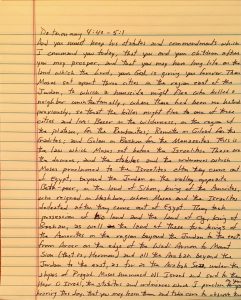
Deuteronomy 4:40-5:1
Deuteronomy 4:40-5:1 1/26/2018
Moses taught the people: Keep the commandments so that you may prosper in the land. He then established by name the three Cities of Refuge for the three tribes which chose to remain east of the Jordan.
Learn and Do
Moses called all the people and spoke to them. His intent was that everyone should understand God’s laws so that they could be practiced.
It was the doing that Moses hoped for. The law wasn’t a separate matter that concerned only the rich or powerful, or professional. It wasn’t merely a social contract that described rights, and privileges and property.
It was an approach to everyday life for people who enjoyed the actual presence of the living God.
An Approach to Living
My intuition is that the law should create a set of boundaries. Then I can confidently say, “Here is the limit of my personal liberty”. I have the right to do whatever I will as long as I don’t cross these boundaries.
It’s an intuition of liberty and personal desire – do what you want, just don’t hurt anyone else.
But God is looking past liberty toward freedom.
Creative soul – express the goodness of God in the habits of everyday living. This is the possibility of my life.
“You have been told, O mortal, what is good, and what the LORD requires of you: Only to do justice and to love goodness, and to walk humbly with your God.” Micah 6:8
The Lord is God
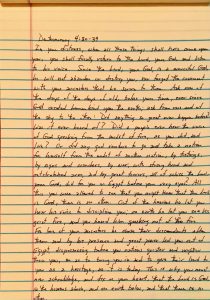
Deuteronomy 4:30-39
Deuteronomy 4:30-39 1/25/2018
Moses told the people in no uncertain terms: The Lord is God and there is no other. What the children of Israel had experienced had never been known before in all the earth. The seeing of God on the mountain; the hearing of His voice speak to the entire community – such things had never been experienced before.
Moses’ Work
Moses worked hard to inform the Israelites about the nature of God. The unique experiences they had in the exodus were distinct signs of God’s unique love for them. The Lord showed himself to the children of Israel as a response to the faithfulness of their ancestors; Abraham, Isaac and Jacob.
Moses stressed that the Israelites cling to the memory of God’s goodness. He encouraged them to hold on to this attitude – to keep God central in their individual and collective awareness.
Fix in Your Heart
Who is God. How will I know Him?
Jesus said to His disciples, “Follow Me”.
He didn’t say this because He was looking for a following. He wasn’t trying to fill a stadium or glorify Himself through the devotion of His adherents.
He said, “Follow Me” because that’s how we might know Him. It’s the following. I know Him when I follow Him.
Simon Peter answered him, “Master, to whom shall we go? You have the words of eternal life. John 6:68










